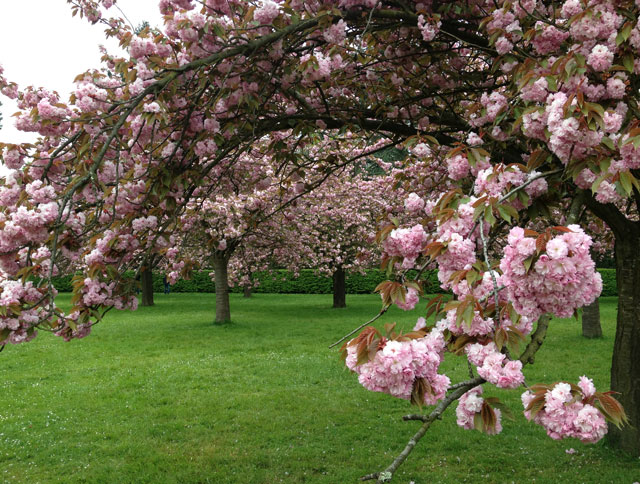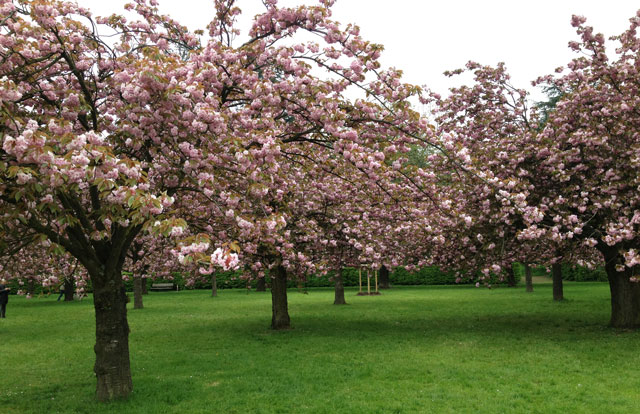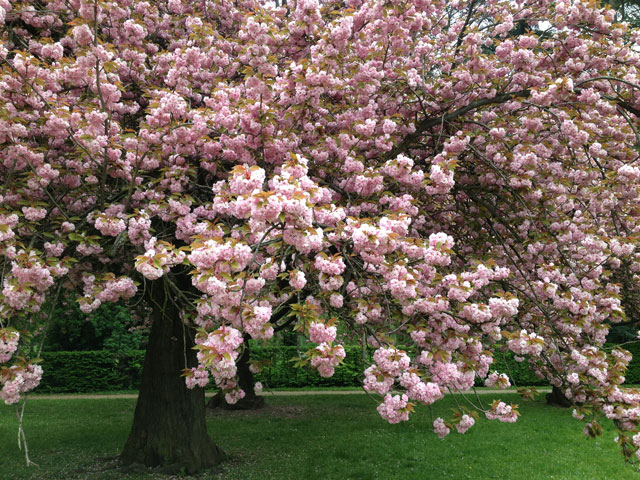Now you might wonder why I am writing a post about something as basic as bonjour which everyone knows means “hello”.
However, Black Cat and I were having a discussion the other day about WHEN and HOW it is used in French which is quite different from the English use of hello.

If I am in a supermarket in Australia and want to ask the man filling the shelves where the coffee is, the most polite way is to go up to him and say, “Excuse-me, but can you tell me where the coffee is”.
Now, if I do that in France: “Excusez-moi de vous déranger, mais savez-vous où se trouve le café?“, I am likely to get a nasty look. The person will say, “Bonjour” and wait for me to reply “Bonjour“, then I have to ask the question again and will get a helpful answer.
If you go into a bakery or a butcher’s shop or even a doctor’s surgery, you should always say bonjour to the people present, and it’s even more polite to follow it with messieurs, or mesdames or messieurs dames depending on who’s present. You can also walk in and say messieurs dames without bonjour.

There is no equivalent to our good morning or good afternoon . Bon matin doesn’t exist, although bon après-midi does (or bonne après-midi because après-midi is one of the rare words that can be both masculine and feminine and keep the same meaning) but that is something you say on leaving and it means “have a good afternoon” which, of course, is quite different.
You can start saying bonsoir instead of bonjour from about 5 or 6 pm onwards, particularly when it’s dark in winter. Bonne nuit is only used when someone is going to bed.
So if bon après-midi means have a “good afternoon”, how to you say “have a good day?” The answer is bonne journée, as opposed to bonjour because the ée ending indicates something that is ongoing. Very occasionally, you might hear passez une bonne matinée (have a good morning) but never bonne matinée by itself ! Bonne soirée means have a good evening (or what’s left of it). Saying Au revoir. Bonne journée when you leave a shop will be very much appreciated.

Every morning when I wake up (provided we wake up at the same time) Jean Michel wishes me bonne journée. I really miss it when he gets up before me. Just before we begin to watch a film at the cinema, he says bon film and at the beginning of a holiday or weekend, he says bonnes vacances or bon weekend.
Now what about salut? This is an informal way of saying both hello and goodbye and is not used to greet the butcher, for example.
Another thing while we’re on the subject is introducing yourself. If you’re invited to dinner and there are people you don’t know, it’s perfectly acceptable to shake their hand and say, “Bonjour, je suis David“, but it’s practically unheard of to give your name otherwise unless asked.
For example, when I wasn’t strong enough to help Jean Michel get a very heavy wardrobe up the front stairs once, he went looking for help and found a man picking up his son from a birthday party next door. Neither he nor the man introduced themselves and to this day, we still don’t know his name. That, in France, is perfectly normal, but would be considered very rude in Australia.
And, I nearly forgot: you only say bonjour once to the same person the same day. After that, you say rebonjour et even just re!
I’d be interested to hear other people’s experience under similar or different circumstances.
If you want to know how to pronounce bonjour and salut, there’s a great You Tube video by French Sounds.
Next Friday: s’il vous plaît which also holds some surprises!
FURTHER READING
 This post is part of Lou Messugo’s All About France montly blog linky. For other posts on France, click on the link.
This post is part of Lou Messugo’s All About France montly blog linky. For other posts on France, click on the link.




Very fitting post — my daughter just recently learned in French class when to say “bonjour” and when you can say “salut”. She had it down pat because she was teaching it to her little sister in the car on the way home from vacation at Easter, along with the proper use of “s’il vous plaît” and “s’il te plaît”.
By the way, the Germans have the same custom of greeting the people sitting in the waiting room at the doctor’s, dentist’s office etc. when you walk in. And when you go back in to retrieve your jacket after your appointment, you also say “auf Wiedersehen”, even if they are completely different people to the ones you greeted on your way in.
It’s much more civilised, isn’t it?
I enjoyed reading this post. Wished I’d known all of this when I first came to France! Also loved the photos of the cherry blossom! Ann
Don’t worry – it took me years to understand the “bonjour” thing when asking for somethign. I felt like a naughty child every time the department secretary at the university would say “bonjour” in reply to my “excusez-me de vous déranger, B., mais …”
I was at the doctor’s (opthalmologist) yesterday and I was interested by how many people did not say ‘bonjour’ as they entered the quite crowded waiting room (serving 2 doctors). I reckon about 50 percent said nothing as they entered, and I was close enough to the door that I heard all the muttered bonjours as well as the clear and confident ones too. The greeting is not an opening to striking up a conversation with a stranger though — after you’ve bonjoured everyone the polite thing to do is to studiously ignore everyone else in the room.
Very often one says bonjour to the room when you enter a restaurant here, and au revoir when you leave, and of course in almost every shop, even in Tours.
I really appreciate the habit of shaking hands and saying your name in a group where there are people you don’t know. Most often it’s just shake and ‘David’, rather than ‘Bonjour, je suis David’.
Now that’s interesting. I would have imagined that outside Paris, people would be even more polite. It’s certainly true that the greeting is not an opening to striking up a conversation – I should have mentioned that!
I’ll have to take note in restaurants in Blois. I’ve never seen it in Paris.
I think I’m going to have to write a follow-up post to take everyone’s comments into account!
Excellent post Rosemary, I think you’ve pretty much covered all options! I think I found the hardest when I arrived was the “Bonjour” before asking for something rather than “sorry to disturb you”. English are sorry for everything!!! I agree with Susan above that when introducing yourself at a party, it’s rarely, “je suis David” but just “Bonjour, David”. This can be difficult when your name is Phoebe as so few people have heard of the name that they often don’t realise I’m actually introducing myself! It’s amazing how fraught with complications such a simple word can be.
Thank you. I can understand the problem with introducing yourself as Phoebe in French! And I guess spelling wouldn’t help would it?
Some very interesting differences here in the use of Hello and Bonjour. Maybe Good Day is really the equivalent of Bonjour (which it is literally of course) because you could go into a room full of people in Australia and say Good day without it seeming like you want to start up a conversation, whereas Hello actually would probably be inviting/expecting responses/conversation. If you said to a guy stacking supermarket shelves ‘Hello’ he’d think it was quite weird; ‘excuse me’ would show you needed help. So it’s not simply the correct words in foreign languages, it’s when and where to use them.
Now that I have lived in France so long, I don’t seem to be able to use G’day any more. It sounds so strange. And you’re perfectly right. It’s not simply a matter of correspondance between two words but when and where to use them. As a professional translator, I often have to explain to clients why exactly the same word doesn’t necessarily have the same translation, even in the same text. It’s all a question of context.
To Rosemary: ahhh, but there’s a difference! I said Good day, in my post, and you said G’day! So it comes down to accent maybe. ‘Good day’, said English style would be just like ‘Bonjour’ – wishing people a good day, not as a conversation opener which ‘Hello’ would actually be. But ‘G’day’ speaks of an Australian accent with a cockney twang and is the same as ‘Hello’ – a conversation starter. ‘G’day mate’ is not really in my vocabulary….!
Hi, I don’t know why I assumed you were Australian. I didn’t know that people actually said “Good day” any more!
I learnt about saying ‘Bonjour’ in my French classes and tried to remember to use it everywhere on my recent visit. I found most people very helpful and pleasant, maybe that’s why. Lyn
I’m sure it helped!
“Bonjour” est une formule de politesse, un signe de civilité, qui permet d’engager la conversation et qu’il est nécessaire, à mon sens, de rappeler aux adolescents oublieux. Par exemple au CDI (Centre de Documentation et d’Information), un élève peut m’aborder en omettant cette formule de salutation, passant directement à sa demande. Dans ce cas, il a droit à un “bonjour” marqué suivi d’un silence attentif. En général, il reformule sa demande après avoir dit “bonjour”.
Oui, c’est exactement ça!
Thanks for linking this up to #AllAboutFrance Rosemary. I loved it first time round, so very happy to see it here again.
You’re very welcome Phoebe. Very busy here yesterday so haven’t been to see many other posts yet.
Excellent explanation of Bonjour! My favorite is when a French friend will try to make a good translation, and tell me, “Good morning!” at 7pm! I always have to explain that the word “jour” isn’t “morning,” but “day!” Bonjour is like “permission to speak,” and the reply is like “granted.” Great post!
Ah yes, “good morning” at 7 pm is a little off-track!
I still find it hard to remember to say bonjour before I ask for something in a supermarket, but I am getting better. But I do love the way the French use bon in so many ways when you part which is what I blogged about in this month’s #AllABoutFrance.
Bonne journée !
Yes, “bon” is very useful! I’ll feature your post on my next blogger round-up which is a little overdue at the moment …